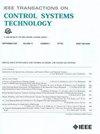基于自适应区间观测器的无角速度三自由度直升机容错控制
IF 3.9
2区 计算机科学
Q1 AUTOMATION & CONTROL SYSTEMS
引用次数: 0
摘要
提出了一种针对电机故障情况下不稳定三自由度直升机的主动容错控制方案。直升机只配备了角度位置传感器,没有独立的速度传感器,这使得其FTC设计更具挑战性。尽管一些研究仅使用角度信息开发了直升机的FTC,但它们需要对系统进行严格的假设。为了解决这个问题,首先引入降阶滑模观测器(SMO)来获取辅助信号,这些辅助信号成为分析系统的输出。其次,为分析系统设计区间观测器(IO),建立容错控制器,并对其参数进行联合优化,使直升机无论是否发生故障,都能保持在可接受的水平。IOs使用自适应参数,提供更严格的范围,从而更准确地估计故障。最后,在三自由度直升机平台上进行了仿真和实验,验证了所提方案的有效性。本文章由计算机程序翻译,如有差异,请以英文原文为准。
Adaptive Interval Observer-Based Fault-Tolerant Control for a 3-DOF Helicopter Without Angular Velocity Measurement
This brief presents a novel active fault-tolerant control (FTC) scheme for an unstable three-degree-of-freedom (3-DOF) helicopter subject to motor faults. The helicopter is instrumented only with angular position sensors and has no independent velocity sensors, which makes its FTC design more challenging. Although some works have developed FTC for helicopters using only angular information, they required stringent assumptions on the system. To circumvent this problem, a reduced-order sliding mode observer (SMO) is first introduced to obtain auxiliary signals, which become the outputs of an analytical system. Next, an interval observer (IO) is designed for the analytical system, and a fault-tolerant controller is established, and their parameters are jointly optimized to ensure that the helicopter performs at an acceptable level, whether there is a fault or not. The IOs use adaptive parameters, which provide tighter bounds, resulting in more accurate estimation of faults. Finally, simulations and experiments on a 3-DOF helicopter platform are conducted to demonstrate the efficacy of our proposed scheme.
求助全文
通过发布文献求助,成功后即可免费获取论文全文。
去求助
来源期刊

IEEE Transactions on Control Systems Technology
工程技术-工程:电子与电气
CiteScore
10.70
自引率
2.10%
发文量
218
审稿时长
6.7 months
期刊介绍:
The IEEE Transactions on Control Systems Technology publishes high quality technical papers on technological advances in control engineering. The word technology is from the Greek technologia. The modern meaning is a scientific method to achieve a practical purpose. Control Systems Technology includes all aspects of control engineering needed to implement practical control systems, from analysis and design, through simulation and hardware. A primary purpose of the IEEE Transactions on Control Systems Technology is to have an archival publication which will bridge the gap between theory and practice. Papers are published in the IEEE Transactions on Control System Technology which disclose significant new knowledge, exploratory developments, or practical applications in all aspects of technology needed to implement control systems, from analysis and design through simulation, and hardware.
 求助内容:
求助内容: 应助结果提醒方式:
应助结果提醒方式:


